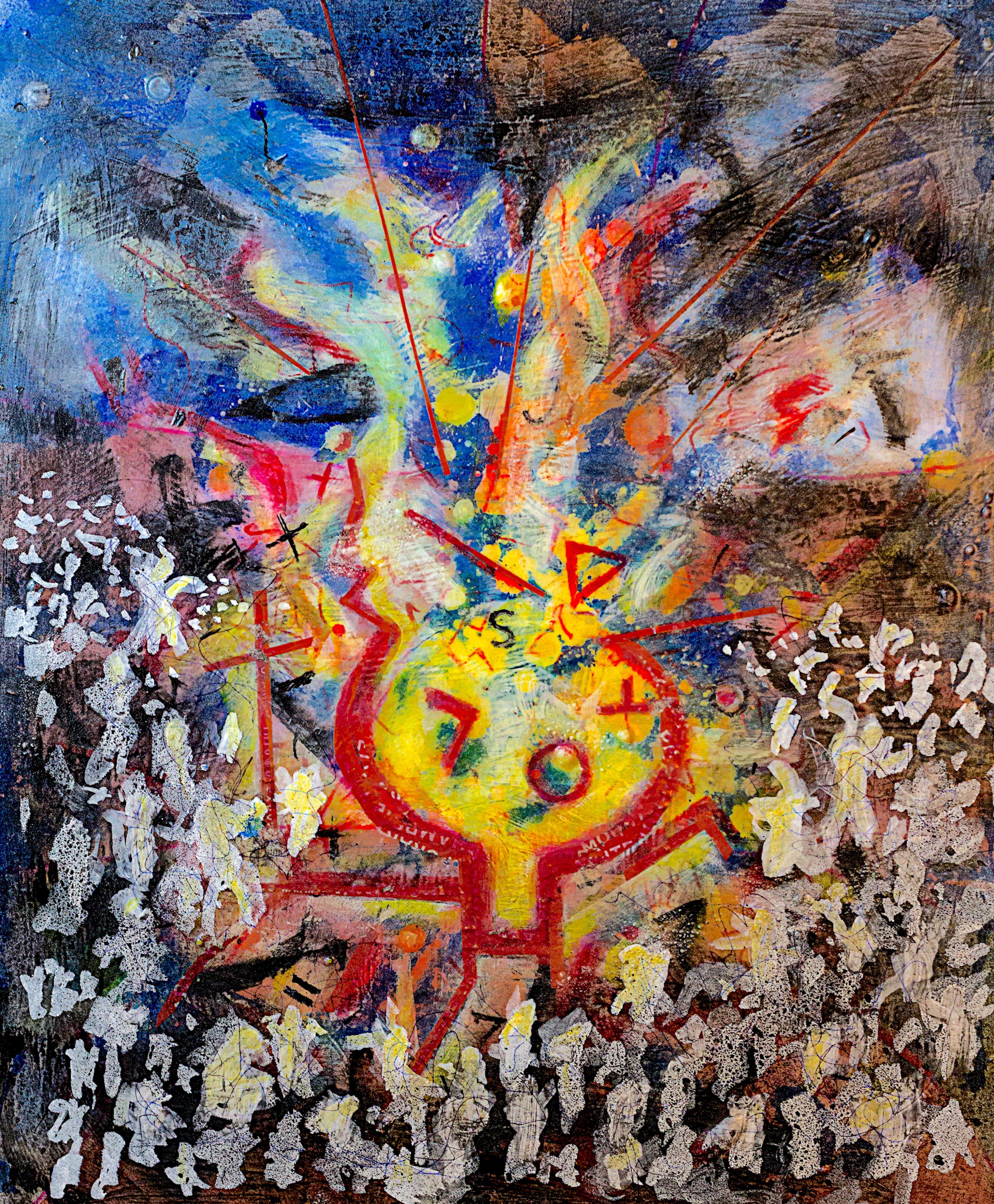
Shelter in Place at the Sobriety Center
by Tony Santi
Art: “Forge” by GJ Gillespie
https://www.gjgillespieartistic.com/
Tornado sirens and sour smells. The perpetually perspiring detox nurse to my left or the unhoused alcoholic to her left? The sirens are apocalyptic, haunting, extraterrestrial—reminiscent of War of the Worlds. A sliver of New Mexico roadside turquoise through a sliver of window. The native Iowans: unphased. The intake process: unhindered.
“How many days out of the past 30 have you had one or more alcoholic beverages?”
“Thirty”
Scribble. Scribble.
I shouldn’t be in this particular concrete-walled room. I stare at my laptop. Half the screen is source text, a poem by a Syrian colleague named Osama Esber; its lines rising and crashing and swirling and embracing and fragmenting. The other half is rigid and level, like a single file of fascist soldiers, phalangists or nazis. To translate Arabic is to bottle the ocean.
My only tornado knowledge comes from grade school science and the movie Twister.
“Have you ever woken up somewhere unexpected after a night of drinking?”
“Hmm yeah—once. I woke up in some lady’s garden with a white rabbit nibblin’ at my fingers.”
Scribble. Scribble.
The nasally voice on the radio begs us to hunker down, to distance ourselves from windows, to get underground. The smell is pervasive. Cat piss, rotting citrus, something moist, sweet, and nutty like toasted corn flakes. Psoriasis scales, sunken eyes, long aluminum strands of hair, a t-shirt with something about being a veteran or a patriot or both. I stare back down at the screen.
You will see in the whiteness
your sadness and your memories and your love and your hate.
You rejoice because they are erased.
In it you will find yourself on a shore
with crashing waves,
forget everything and wade in the water.
It’s better in Arabic, but that’s always the case. A translator is nothing but a butcher, a thief, a rapist. I’m struggling with punctuation. The Arabic language is unfortunately fond of the run-on sentence. I simply stare at the stanza.
“Have you recently had little interest or pleasure doing things?”
“What sorts of things?”
“All things.”
“No pleasure at all.”
Scribble. Scribble.
Now, a sliver of gray through a sliver of window. The sirens bawl. The little man in the radio is too panicked. The detox nurse and the alcoholic aren’t panicked enough. I don’t know how to be. The fallen toddler knows to sob only when mother looks concerned. Fear is learned, circumstantial, and contextual.
I was in Lebanon once, out east in a city called Baalbek. I walked among the Roman ruins, past the Temple of Jupiter, and the sky was a chemical blue, a sickly man-made fluorescence, something too much to be natural. It distracted from the ruins, and when the gunfire started, I was left staring up into the blue. A flock of Spanish tourists took cover behind a great Roman column, a wide-eyed and collective ay dios mio. The gunfire was a few clicks west, down in a nearby village. A call and response, a spattering of pops and crackles.
Two police officers stood at the base of the white granite stairs, their bellies pushed out against bulletproof vests, Vietnam era M16’s slung to their sides, exchanging charming anecdotes about demanding wives and ungrateful children. They were unphased, grinning. I hustled down the stairs, ducking.
“Is this normal?”
They said something I didn’t understand and laughed.
“Ah yes, it is normal,” said the bald one, recreating my slow American-accented Arabic. “Don’t worry. The tribes know not to shoot at expensive things like ruins and tourists.”
“It’s just a wedding,” I said to the Spaniards above. “A celebracion.” We laughed at our silly selves and basked in the ruins of a superior civilization, only slightly overshadowed by the toxic blue and not-so-distant violence.
forget everything and wade in the water.
But now, to die here with these people. To die in my stiff security guard’s uniform. To die mid-translation. Is this where I call my mother? Where life flashes before my eyes? Is it the good things or all the things, and how long does it last? forget everything and wade in the water. Osama is Syrian. His sirens sound different. We don’t talk about it.
“Do you often feel like a failure?”
“Well, it’d be hard not to.”
Scribble. Scribble.
The tornado passes.
Tony Santi studies English at the University of Iowa with a minor in Literary Translation. Before attending university, he served five mildly unpleasant years in the U.S. Army as an Arabic Linguist. He currently lives in an attic with his hamster in Iowa City.

